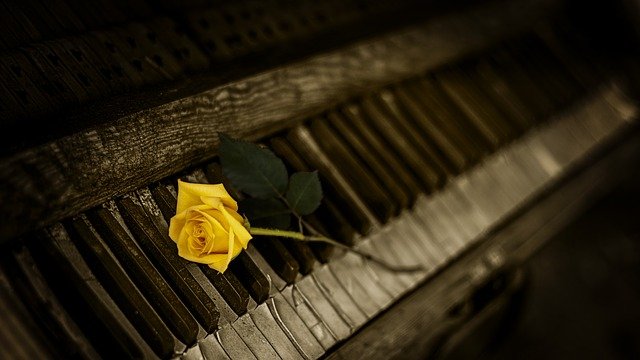
Dear Friends of the Pub Quiz,
“One good thing about music, when it hits you, you feel no pain.” Bob Marley
As a functionally blind theatre director, my father could not rely on notes when observing the run-through of a play during rehearsals. As a result, he had to pay special attention during a performance, organizing in his head all his various encouraging or corrective comments for his actors, lighting and sound technicians, and assistant directors so that his “vision” of the play could be realized in time for opening night.
My dad running a rehearsal was a marvel for me to behold not only because I knew better than anyone else in the room how blind my dad was, but also because of how masterfully and authoritatively my dad communicated all the “notes” that he had gathered for the members of the production. I once remember him telling an actor, rather cuttingly, that she was “answering a question that no one was asking.” The people on stage knew just what he meant.
I saw a similar maestro (in this case, maestra) take the stage at the Richard Brunelle Performance Hall at Davis Senior High School this morning. After a Concert Band performance, which included my son Truman on alto saxophone, Susan Hamre came out of the audience to talk to the musicians. Hamre is the outgoing director of the Symphonic and Concert Bands and the Musical Theater Ensemble at American River College (where I have also taught), and someone who knows her craft exceptionally well.
Maestra Hamre was clearly meeting these apprentice musicians (at the “Earth and Alchemy” Music Festival) for the first time, for she spent her first few minutes orienting herself to the location and numbers of the musicians who made up the concert band. And then she started with the lessons, asking groups of musicians to play certain parts of the classical pieces that they had previously performed, and pointing out to them what makes the pieces lush, bracing, exhilarating, or sublime. She explained why she needed more gusto from the supporting instruments, and why she needed the higher-pitched instruments, such as the flutes, to play more quietly. By breaking works and movements into combinations of sounds, with different tempos and musical emphases, the visiting conductor helped the students and parents in attendance hear magic in the music that they would not have otherwise noticed, or reveled in.
While I felt lucky to be in the audience for this 20-minute lesson, I also found myself wishing that I had taken musical performance classes in high school or college. Nostalgic for my college days, I found myself also missing those times in my life when I could sneak into Boston University classes that I was not enrolled in, just to hear a great speaker analyze or reassemble a great work of literature. During my last two years as an undergraduate, the combination of “stolen” classes and public lectures made me feel like my mind and heart were constantly brimming with facts and performances.
When I arrived practically penniless in Berkeley as a new college graduate, I continued this habit by slipping into the back of lecture halls at Cal, learning about classical music history and theory from a Music 27 large lecture class (“Introduction to Western Music”) taught by a seemingly venerable but energetic professor who taught while sitting and playing at a grand piano. (He was probably about the age that I am now.) A couple decades after illegally taking that class at UC Berkeley, I helped Kern Holoman, an equally charismatic authority on classical music, figure out how best to use our campus learning management system to share music files with UC Davis students in Music 10: Introduction to Music. That welcome assignment required that I sit in on some of Kern’s lectures – what a treat! I was reminded what Billy Joel once called music: “an explosive expression of humanity.”
While now my artsy conversations with my dad take place in my memories and in my dreams, I do feel lucky in this life to have had so many opportunities to learn from, interact with, and gain inspiration from great teachers, including music teachers. When I retire in a dozen years or more, I might have the time and budget to return to instruction in a musical instrument or two. Perhaps by then I will be teaching Zoom classes while sitting at my own piano, whether warranted or not.
This week’s Pub Quiz will feature topics raised above, as well as the following: Quantum mechanics, shadowy figures, faraway cities, replacement playboys, green lawyers in other languages, prisoners of war, friends with Mercury, eye color, playing catch, Nobel Prizes, names in the news, chemical properties, Patreon, big cities, rarified sports, the all of vision, detanglers, poetry, keys, confirmed prisons, the importance of action, winning the acronym, ablation concerns, youthful athletes, NPR designations, kennels, common last names, current events, and Shakespeare.
Julia Levine reads with Frank Gaspar this Thursday night at 7 atop the John Natsoulas Gallery. It’ll be a warm day, so dress in layers!
Thanks for reading to the end. Be well.
Dr. Andy
P.S. Her are three questions from last week’s pub quiz. Please SUBSCRIBE via Patreon to receive 31 questions every week.
- Pop Culture – Music. With its passionate vocal and sweeping orchestration, the 1960 release of the song “At Last” is often chosen for weddings and wedding receptions. Name the musician who famously performed the 1960 version of this 1941 classic.
- Science. What sort of jawless fish may be characterized by a toothed, funnel-like sucking mouth?
- Pop Culture – Television. Of the four primary actors in the TV show I Love Lucy, who died first?



